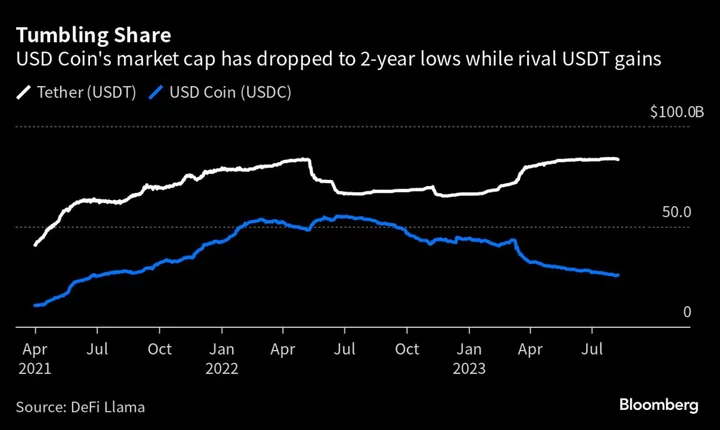CoreWeave, a cloud computing provider that’s becoming one of the hottest startups in the artificial intelligence race, is exploring a minority stake sale that values the company at as much as $8 billion or more, according to people with knowledge of the matter.
The Roseland, New Jersey-based company, which previously specialized in ethereum mining, is working with an adviser as its management team seeks buyers for a roughly 10% equity stake at a valuation of between $5 billion and $8 billion, said the people, who requested anonymity discussing confidential talks. Terms haven’t been finalized and could still change, they added.
CoreWeave is projected to achieve about $1.5 billion in revenue in 2024, a person with knowledge of the matter said.
A CoreWeave representative declined to comment.
CoreWeave was an early adopter of Nvidia Corp. graphics chips for data centers, getting ahead of a wave that’s sweeping through technology. Some of the biggest names in the industry have realized the potential for the use of that technology in artificial intelligence training, causing a flood of orders for Nvidia, which has unveiled plans for the world’s fastest AI supercomputer.
CoreWeave is building out data centers based on Nvidia’s chips to offer artificial intelligence-related computing as a service. Earlier this month, Nvidia CEO Jensen Huang name-checked the company on his earnings conference call saying it’s doing “incredibly well.”
Led by Chief Executive Officer and co-founder Michael Intrator, CoreWeave has raised $421 million in equity this year, including from Nvidia, which is valued at more than $1.2 trillion. Microsoft Corp. has agreed to spend billions of dollars over several years on cloud infrastructure from CoreWeave, CNBC reported in June.
CoreWeave said earlier this month it secured $2.3 billion in debt financing led by Magnetar Capital and funds managed by Blackstone Tactical Opportunities. Coatue, DigitalBridge Credit and affiliates of BlackRock, Pimco and Carlyle also participated, the company said.
--With assistance from Ian King.









